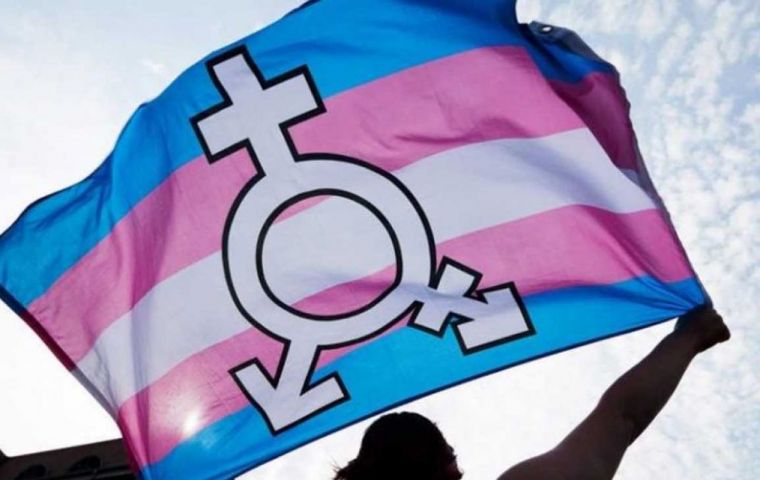MercoPress. South Atlantic News Agency
National Trans Visibility Day celebrated in Brazil
 The demonstrators celebrated the occasion and remembered the deaths of transsexual and transvestite people in Brazil
The demonstrators celebrated the occasion and remembered the deaths of transsexual and transvestite people in Brazil Members of Brazil's LGBT+ movements and of the transsexual and transvestite community celebrated National Trans Visibility Day with parades nationwide, the largest two being in Rio de Janeiro and São Paulo, it was reported.
The coordinator of the Trans and Transvestite March of Rio de Janeiro, Gab Van, told Agencia Brasil that the march at Praia Leme, a beach in the southern zone of the city, was thought to expose the bodies considered “outside the standard”, in commemoration of Trans Visibility Day, which is celebrated on January 29.
“Today, occupying this space, occupying Leme, for us is an act of militancy. Because many people never came after their [gender] transition. They didn't come back to the beaches. So, to come back with another perspective, with another look, with another presence, and feeling welcomed and belonging to this place, brings not only a quality of life, beyond the feeling of belonging. The feeling of existing. I can exist everywhere,” Gab said.
Ágata Tariga, of the NGO Capacitrans, said that Trans Visibility Day goes back to 2004 when the campaign Travesti e Respect was launched in Brasília. For her, going to the beach on a daily basis can represent danger and aggression. “We are not very passable bodies, we are diverse bodies. And because we are trans women and men, many not mastectomized, and other trans people with non-standard bodies, then we are a little afraid of going to the beach, because just by coming to the beach we are already looked at with other looks, insults, or sexual harassment. So if we occupy the beach, all of us together, we will feel more at ease. We notice that even the looks change because many people are here. If there is only one, only one, the looks are really different,” she said.
Ágata remembers that, in the last decades, some rights have been achieved by the trans population, such as hormone therapy, their social name in documents, and the right to change their name and gender on birth certificates.
According to Representative-elect Dani Balbi, in Rio de Janeiro around 15 thousand people declare themselves as transsexuals. These people have specific demands to be met by public policies. “We hope to make a dense mapping qualitatively, not only quantitatively so that from there we can define public policies. They are fundamental, especially those that guarantee access to formal education because most transsexuals and transvestites end up dropping out of school. And also public health. Because the health of transsexuals and transvestites is peculiar, it requires some degree of peculiarity, of specificity, and training.”
Meanwhile, in São Paulo, a walk on Paulista Avenue in front of the Art Museum was staged to celebrate National Trans Visibility Day. The demonstrators celebrated the occasion and remembered the deaths of transsexual and transvestite people in Brazil.
The country leads the world ranking for the 14th time, according to a study by the National Association of Transvestites and Transsexuals. There were 131 murders in 2022.
Pastor Jacqueline Chanel organized the São Paulo event. “This is a protest for life, because our lives matter, also for this society. We want more rights and public policies to serve our community, of transgender women and transgender men,” she said while calling for more transversal action on the part of the government regarding education, health, employment, and public security.
Feminist researcher Hailey Kaas, 30, says her adolescence before she realized she was a trans woman, was a very difficult period: “I suffered bullying, like many trans people, but fortunately I was able to go to college, something that many trans people don't have. I am the exception to the rule,” she argued.
“It goes through several spheres of society, it's not only 'I feel differently', but, for that, I have to have health, hormone therapy, the SUS [Sistema Único de Saúde - Unified Health System] has to cover surgery, and this has been a struggle in the last years,” she went on.
Hailey also explained that having their social names on the ID cards “made it easier for us to get jobs, we are not embarrassed in the spaces where we have to give our name and ID, even though we still have to go to each agency to make the change.”
Pedro Silvério, 28, a volunteer at the Brazilian Institute of Transmasculinities who helps other trans people, said that “our bodies are invisibilized.” For him, mental health is a fundamental aspect of this population. “We suffer a lot of violence. This reinforcement is very important, both in SUS and in private institutions.”
(Source: Agencia Brasil)




Top Comments
Disclaimer & comment rulesCommenting for this story is now closed.
If you have a Facebook account, become a fan and comment on our Facebook Page!